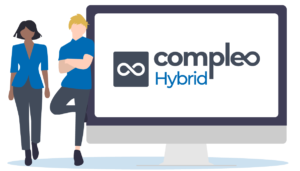- Italy, a pioneer in the deployment of electronic invoicing
- Serbia took its first steps towards mandatory B2B e-invoicing
- Poland is facilitating the transition to e-invoicing with its KSeF platform
- Spain wishes to make e-invoicing mandatory in B2B transactions
- In Luxembourg, e-invoicing still represents a significant challenge for businesses
- In Germany, the use of electronic invoices is developing in a heterogenous manner at the level of the Länder
- Progressive compliance
Electronic invoicing is becoming increasingly widespread and is gradually developing within the European Union. The use of electronic invoicing has become mandatory in Europe for public sector exchanges (B2G). The European Directive 2014/55/UE requires all Member State administrations to receive and process e-invoices compliant with the EN16391 standard.
However, some European countries remain on the sidelines of the movement that is becoming more widespread in the private sector (B2B). As a result, the electronic invoice in Business to Business (B2B) transactions is only being deployed on a voluntarily by Member States.
Although measures vary from one European country to another, they are nevertheless tending to become more homogeneous. Many countries have already come a long way in introducing electronic invoicing in the Business to Government (B2G), Business to Business (B2B), and Business to Consumer (B2C) sectors, notably in Serbia and Italy. Other countries such as France, Spain, and Poland, want to extend the mandate to B2B transactions in the coming years.
Therefore, we present an overview of the participating European countries’ standards and legal e-invoicing regulations.
Italy, a pioneer in the deployment of electronic invoicing
Italy has been the leading country in this domain. In 2015, the Italian government imposed electronic invoicing for all public entities. The required format is FatturaPA (XML format) and electronic invoices must go through the Sistema di Interscambio platform SdI.
On January 1, 2019, electronic invoicing became mandatory for all B2B and B2C transactions. Italy is the first European country to have implemented electronic invoicing for B2B transactions. However, this system exempted companies with an annual revenue of less than 65 000 euros. Then, on July 1, 2022, Italy extended the obligation of electronic invoicing to cross-border transactions and companies with an annual revenue of less than 65 000 euros per year. The companies still exempted are microenterprises with annual revenues or expenses of less than 25,000 euros. However, they will have to start issuing electronic invoices from January 1, 2024.
Serbia took its first steps towards mandatory B2B e-invoicing

The Serbian government also aims to make electronic invoicing mandatory on a nationally. The law came into effect in 2021 and confirmed the deployment schedule for e-invoicing. From May 1, 2022, any supplier to public administration must send invoices electronically. Public institutions must be able to receive and archive them. From July 1, 2022, public agencies must issue electronic invoices to private companies. Companies must be able to receive and process them.
Finally, from January 1, 2023, e-invoicing has been extended to B2B transactions. The Serbian government has introduced a national portal Sistem E-Faktura (SEF), based on the Italian model. This platform allows sending, receiving, collecting, processing, and archiving e-invoices. Invoices must be issued in an XML format and comply with the UBL 2.1 standard.
Poland is facilitating the transition to e-invoicing with its KSeF platform
Starting in 2024, electronic invoicing for B2B transactions will become mandatory for all Polish companies subject to VAT. In 2019, the Polish government took the first step by creating a central platform called PeF, which allowed all public entities to receive e-invoices. Suppliers could also connect to this platform and send their invoices electronically .
To facilitate the nationwide transition to e-invoicing, a new centralized platform has been launched: the KSeF platform, which has been operating since January 1, 2022. To exchange documents through this platform, users must issue invoices in a standardized XML format specific to Poland (FA_VAT).
Spain wishes to make e-invoicing mandatory in B2B transactions
Since 2015, Spain has made e-invoicing mandatory in the public sector. Public sector providers must send their invoices through the FACe platform in the Facturae format (XML format). In addition, this country aims to generalize e-invoicing to all B2B exchanges from 2024.
In Luxembourg, e-invoicing still represents a significant challenge for businesses
Since 2019, a public administration requirement has been to receive and process electronic invoices. Since May 2022, Luxembourg has been gradually implementing mandatory electronic invoicing via the PEPPOL network to transmit all documents exchanged in the public employment markets in a structured format (XML format). However, there are currently no regulatory obligations in the B2B sector.

In Germany, the use of electronic invoices is developing in a heterogenous manner at the level of the Länder
The receipt and processing of e-invoices have been mandatory for high federal authorities in Germany since November 2018. At the communal level, other federal authorities and public buyers have progressively followed suit. Since November 2020, public sector providers have been required to submit their invoices in an electronic format in accordance with the XRechnung German standard in its current version. XRechnung is a CIUS of the European standard EN16931. The hybrid format Factur-X (known as ZUGFerD) will only be accepted starting from the 2.2 version, provided it uses the XRECHNUNG reference profile.
In Germany, the validity of e-invoices depends on the European standard, the federal regulation on electronic invoicing (ERechV), and specific regulations of the Länder. In the German national system, these regulations sometimes differ significantly from one Land to another. There is no single exchange platform but rather different portals and transmission channels. Two invoice reception platforms implemented are the ZRE for federal authorities and OZG-RE at the level of certain Länder; however, they are not interchangeable. Other possibilities, such as the portal specific to the Land of North Rhine-Westphalia, are available. Peppol should represent the preferred method for automated invoice transmission for many companies. This transmission mode allows for automated invoice exchange both in Germany and internationally.
Progressive compliance
Nearly half of the European countries have already generalized B2G e-invoicing, and an increasing number want to make B2B e-invoicing mandatory in the coming years. However, each country has its own criteria and technical specificities of e-invoicing. Ensuring complete compliance with the legal requirements specific to each country is, therefore, a challenging task. Faced with this challenge, companies will have to prioritize modular offers and partners with extensive experience in electronic invoicing.
Symtrax

We support all companies wishing to comply with each country’s accounting and tax requirements. We are a Certified Peppol Access Point. Symtrax allows you to manage your electronic exchanges on a global scale. As a service provider, Symtrax takes care of the conversion, transfer, and status monitoring of invoices in all your exchanges, B2G, B2B, and B2C.
